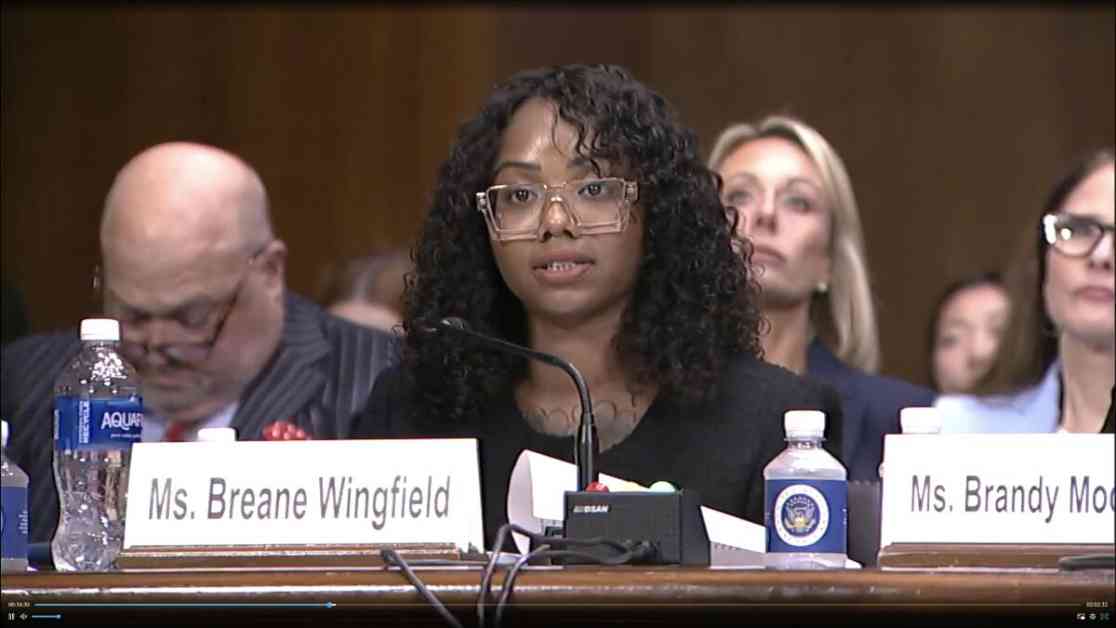Exposing Widespread Sexual Abuse in L.A. County Juvenile Halls: Senate Hearing Sheds Light on Horrifying Reality
Breane Wingfield bravely testified before a Senate Judiciary subcommittee, recounting the horrific sexual abuse she endured as a 14-year-old girl in the Los Angeles County juvenile halls and camps. Wingfield detailed being sexually assaulted by a deputy probation officer in a van at Los Padrinos Juvenile Hall in Downey, in a holding cell at the Compton Courthouse, and almost daily by a guard at Camp Joseph Scott in Santa Clarita. Her voice cracked as she described the abuse, stating, “No one interfered or protected us. I did what I needed to do to survive.”
The Senate hearing, titled “Sexual assault in U.S. prisons two decades after the Prison Rape Elimination Act,” aimed to address the ongoing issue of sexual violence in correctional facilities across the country. Despite the enactment of the Prison Rape Elimination Act in 2003, which aimed to eradicate rape in prisons, sexual abuse has persisted. Sen. Cory Booker, chair of the subcommittee on criminal justice and counterterrorism, expressed deep concern over the prevalence of sexual violence in carceral settings and the need for improvements to reduce abuse.
L.A. County’s juvenile halls and camps have been plagued by reports of sexual abuse, with victims coming forward to share their traumatic experiences. The county’s Probation Department has faced scrutiny since 2020 when California passed a law allowing victims of childhood sexual abuse to sue. Allegations of abuse dating back to the 1950s have flooded the county, implicating facilities such as foster homes, children’s shelters, and probation camps and halls.
Victims have accused the Probation Department of turning a blind eye to rampant sexual abuse within the camps and halls, with abusers remaining on the county payroll for years. One such case involves Thomas E. Jackson, a former deputy at the Santa Clarita juvenile camp, who was accused by at least 20 women of molesting them in the late 1990s. Jackson resigned from the department amidst the allegations. The county has placed numerous staff members on leave following accusations of sexual violence, highlighting the widespread nature of the problem.
During the Senate hearing, survivors of sexual assault, criminal justice experts, and union representatives of prison staff provided testimony. Survivors expressed frustration with the lack of educational resources provided to inmates regarding their rights and how to report abuse. Witnesses also cited staffing and resource shortages as contributing factors to the failures of the Prison Rape Elimination Act. Additionally, auditors were criticized for not having enough time on-site to assess facilities’ compliance with the law’s standards.
Sen. Jon Ossoff and Sen. Cory Booker raised concerns about the effectiveness of the Prison Rape Elimination Act, noting that staffing shortages alone were not to blame for the prevalence of sexual abuse in correctional facilities. The need for improved enforcement of the law and accountability for those responsible for allowing abuse to occur was emphasized during the hearing.
Breane Wingfield, now a graduate of Cal State Long Beach working as a substitute teacher, shared her ongoing struggles with the trauma of the abuse she endured. Without health insurance, Wingfield cannot afford therapy and has relied on crisis hotlines for support. She called for action from the senators to end the cycle of suffering and enforce the Prison Rape Elimination Act to protect vulnerable individuals in carceral settings.
As the Senate hearing sheds light on the pervasive issue of sexual abuse in L.A. County juvenile halls and camps, advocates like Courtney Thom continue to fight for justice on behalf of victims. The call for accountability for those who perpetrate abuse and the entities that allow it to happen remains urgent. It is clear that systemic changes are needed to address the root causes of sexual violence in correctional facilities and ensure the safety and well-being of all individuals in custody.



























